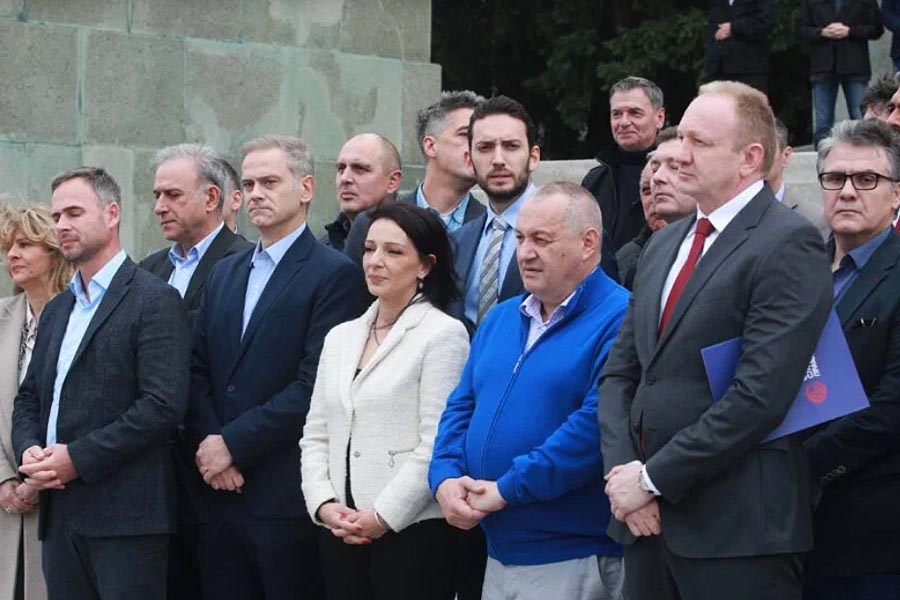According to Demostat, it is necessary for the strongest opposition force - the coalition "Serbia against Violence", to remain together because this is a condition for further growth, and it turned out that the united performance has already yielded results (winning 65 seats in the National Assembly) despite the election conditions. Therefore, the main task of the opposition is unity and inclusivity
An important segment for improving the not healthy political climate in Serbia is the international pressure, which is already present, and which the Government feels very much, although, above all, the President of the state is trying to convince the public that he does not care about the opinions of representatives of official Brussels, that the electoral process was marked by numerous shortcomings, including the purchase of votes, different types of pressure on voters, “mass migration of voters” (bringing people from different parts of Serbia and Republika Srpska to vote in local elections in the capital)
Another possible scenario for the opposition would entail the non-acceptance of the mandate, i.e. the complete delegitimization of power. As Demostat estimates, such a way of fighting would make sense in some other types of regimes, while in the current moment in Serbia, when we have a hybrid regime, with pseudo-institutions and strong influence of the international community, the opposition should take everything that belongs to it and step by step win the support of citizens

According to Demostat, it is necessary for the strongest opposition force - the coalition "Serbia against Violence", to remain together because this is a condition for further growth, and it turned out that the united performance has already yielded results (winning 65 seats in the National Assembly) despite the election conditions. Therefore, the main task of the opposition is unity and inclusivity
An important segment for improving the not healthy political climate in Serbia is the international pressure, which is already present, and which the Government feels very much, although, above all, the President of the state is trying to convince the public that he does not care about the opinions of representatives of official Brussels, that the electoral process was marked by numerous shortcomings, including the purchase of votes, different types of pressure on voters, “mass migration of voters” (bringing people from different parts of Serbia and Republika Srpska to vote in local elections in the capital)
Another possible scenario for the opposition would entail the non-acceptance of the mandate, i.e. the complete delegitimization of power. As Demostat estimates, such a way of fighting would make sense in some other types of regimes, while in the current moment in Serbia, when we have a hybrid regime, with pseudo-institutions and strong influence of the international community, the opposition should take everything that belongs to it and step by step win the support of citizens

The current political crisis can continue in the coming months, despite attempts by the authorities, led by Aleksandar Vucic, to downplay or deny the problems Serbia faced after the elections held on December 17th, marked by numerous irregularities, including vote buying, various types of pressure on voters, “mass voter migration” (bringing people from different parts of Serbia and Republika Srpska to vote in local elections in the capital).
According to Demostat, it is necessary for the strongest opposition force - the coalition "Serbia against Violence", to remain together because this is a condition for further growth, and it turned out that the united performance has already yielded results (winning 65 seats in the National Assembly) despite the election conditions. The main task of the opposition is unity and inclusivity.
In all likelihood, the opposition will continue the fight for annulment of the elections, by addressing the competent institutions - the Republic Election Commission, the Belgrade City Election Commission, the Supreme Court, which are highly politicized, instead of being independent.
Demostat also estimates that the opposition will accept mandates in the National Assembly, in order to hear critical voices. This kind of opposition could be reinforced by occasional street protests.
An important segment for improving the unhealthy political climate in Serbia is the international pressure, which is already present, and which the Government feels very much, although, above all, the President of the state is trying to convince the public that he does not care about the opinions of representatives of official Brussels, that the election process was marked by numerous shortcomings, including the official campaign.
Among other things, MEPs, who were members of the international observation mission on December 17th, the previous statements put the focus on irregularities observed primarily at the polls in the Serbian capital, but this does not mean that the upcoming EP Resolution will not find negative assessments on voting at the level of the entire country.
Let us remind, according to the knowledge of Demostat, the document of the European Parliament on the elections in Serbia is expected to be “sharp”. (demostat.rs/sr/vesti/
On the other hand, Vucic rushed to state that he was “not interested” in what the EP would say.
“They will always make recommendations against Serbia, we will thank them and continue on our way”, the President of Serbia said, with an ironic remark: “I cant explain how much I am sick and how much I will not be able to sleep until February 8th-9th or any other date”.
Despite the above claims of the president of the state, it is significant that the constitutive session of the new convocation of the National Assembly is scheduled for February 8th, two days before the vote on the European Parliament Resolution.
Demostat estimates that the governing parties can form a majority in Belgrade, with some representatives from the “We, The Voice of the People” list, as well as some representatives from the “Hope” list (Aleksandar Shapic, in all likelihood, is lobbying heavily for this), but Vucic is aware of the pressure of the international community, as well as the fact that this local government would not have legitimacy. As Demostat already wrote after the elections, people who voted for the opposition parties did not vote for those parties to be in coalition with the Progressives.
Aleksandar Shapic, without any doubt, would like to remain in the mayors chair in the said way, i.e. not to repeat the elections, but Vucic is the one who decides. To our knowledge, people from the Serbian Progressive Party and the Socialist Party of Serbia (Aleksandar Markovic and Nikola Nikodijevic) are loyal to Vucic, not to Shapic.
That the local elections in the capital will be repeated, Darko Glisic, president of the SNS Executive Board, clearly indicated. He told TV Pink that this could happen in June or in July. Keeping in mind the deadlines for the formation of the government, such timing would actually mean that the citizens of Belgrade will get a new mayor only in the autumn.
Another possible scenario for the opposition would entail the non-acceptance of the mandate, i.e. the complete delegitimization of power. As Demostat estimates, such a way of fighting would make sense in some other types of regimes, while in the current moment in Serbia, when we have a hybrid regime, with pseudo-institutions and strong influence of the international community, the opposition should take everything that belongs to it and step by Step win the support of citizens. This is supported by the fact that the opposition parties won more than in the elections held in 2022, with all the shortcomings of the electoral system and the media blockade that has existed for years.
Also, the Demostat estimates that a government to be formed, most likely in the early spring, can hardly survive the entire mandate (in spite of the fact that the President hopes for it). Namely, the current political crisis can become permanent, unless there is at least a repetition of local elections in Belgrade and different electoral conditions.
The precondition for a true improvement of electoral conditions is the will of the government and a real dialogue between the government and the opposition. Unfortunately, at the moment we do not see that there are conditions for this, except for some international mediation, which tells us that our democracy is collapsing and society is being destroyed. According to Demostat estimates, it would be necessary for the implementation of any agreement on election conditions to be supervised by independent international bodies, rather than the Regulatory Body for Electronic Media, which has proved to be biased against pro-regime media a long ago.
In all societies there are issues that are rather being skipped. Certain...
The neoliberal path, started in 2001, has led to especially bad results in Serbi...
For centuries, the region was subsumed within the Ottoman and Hungarian Empires,...
"Serbia has returned to the systemic and anti-systemic position of the political...
In reality, Serbia is closer than ever to NATO. In the course of the last five y...